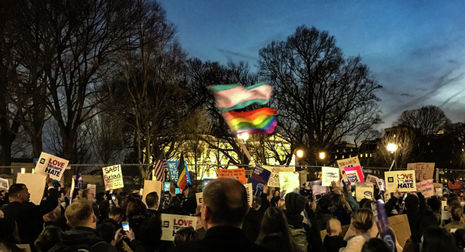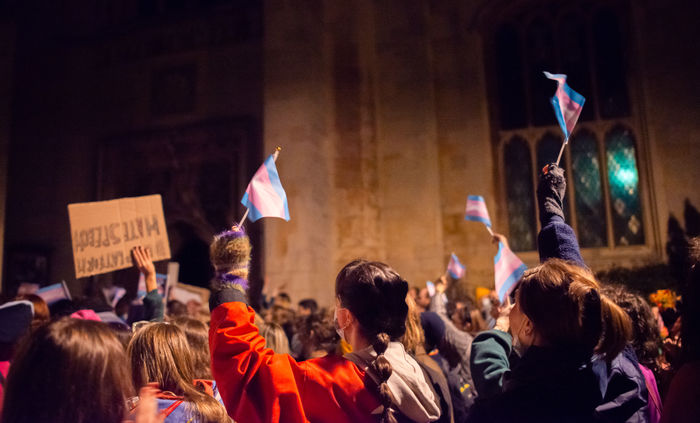I went through the trans healthcare system – we need to let Helen Joyce speak
My experience with trans healthcare made me realise how little we know about gender, and how important it is to remain open to conversation

On this day, three years ago, I was sat in a doctor’s office in Cambridge asking to be referred to the Tavistock for gender-reassignment surgery. But my experience of gender-affirming care has left me doubtful of the good it does those who struggle with their body and identity. I fear for young people who, like me, are pressured into transition before receiving proper psychiatric help.
I grew up a tomboy, like a lot of women. Climbing trees, playing sports. Pretty normal stuff. But by early puberty the other tomboys seemed to grow out of these preferences. And I didn’t.
I hated the attention my new womanly body attracted. Before men had complimented me on how smart I was or how fast I was. Now they were congratulating me on my breast size. Society had a new role for me. I was supposed to grow up and get married; to have get pregnant and have babies. But this isn’t what I wanted for my life. I wanted to be a physicist, not a baby-making machine. I felt as if I were being held hostage by my own body. And I was repulsed, disgusted by it.
I looked at the boys and saw a way out of everything I didn’t want to be
The sense of entrapment only grew the older I got. I looked at the boys and saw a way out of everything I didn’t want to be – saw everything I wanted to be. Their flat chests made me envious. Their clothes. Their short hair. The fact their attraction to women could be reciprocated…
The distress and longing took its toll. It was a kind of heartbreak. Every time I saw myself in the mirror, heard my reedy voice, I saw how my body was keeping me back from who I was meant to be, and the pain deepened.
When I was diagnosed with gender dysphoria everything finally made sense. There was a reason I hated my body so much – the body wasn’t mine. With the help of friends and the encouragement of therapists I began to lean more into my true boy-self, changing my pronouns, and appearance. Things got better. The heartbreak diminished and the sense of dislocation I’d always felt ceased to be so stark.
But the effect was short lived, and after a time the longing returned with the same familiar intensity: dressing up wasn’t enough. Because at some point I’d have to undress and see myself for what I was. A biological female.
This is when I put in for a referral for stage one of gender reassignment surgery.
Even when I asked, I doubted the impact surgery was going to have. Socially transitioning didn’t get rid of my mental health problems in the way I thought it would – in the way I was told it would. Friends said this was because I hadn’t been able to fully transition yet. Therapists intimated the same. But crushing my breasts to my chest with a binder only helped sometimes. I knew they were still under there. And I had a sense that, even if they were gone, and I had a full mastectomy, I’d still be haunted by the ghost of them.
This is when I began to listen to gender-critical views. I learned of all the things that made girls predisposed to gender dysphoria: a tomboy personality, homosexuality, sexual trauma, autism, hormonal disorders. Turns out, I had many these things.
And I am not the only one. Of gender dysphoric people who present in gender clinics, a disproportionate number are gay or autistic or both. These people make up a majority of detransitioners who, like me, felt they had been convinced into life-altering surgery when they were still a child.
I eventually left the trans healthcare system. My misdiagnosis is why I support Helen Joyce’s right to speak.
Statements from the SU and other LGBTQ+ officers within the university echo the same sentiment that adored most of the placards seen at the protest: “Trans lives are not up for debate.” This is in response to belief that Joyce denies the existence of trans people or discredits the legitimacy of their feelings. Yet anyone who attended Tuesday’s talk -- anyone who has read or listened to Joyce -- knows she has no interest in controlling who people are and how they live: “I think people should be free to do whatever they want”.
You would not know this was her point of view because this is not how she or her argument is portrayed in the press. This newspaper published four pieces about Joyce’s appearance in as many days. She was referred to as an antisemite, a TERF, and a transphobe. And yet not one of these pieces supposedly describing Joyce’s views fully quotes the woman herself.
The fact of the matter is Joyce’s argument is far more nuanced than she is given credit for; and, far more important, not everyone who identifies as trans and is receiving trans medical care is trans. In the same way that it is said that “not all trans people are gender dysphoric”, not all gender dysphoric people are trans. I was one of them. When Joyce says, “we have to limit the harm and that means reducing or keeping down the number of people who transition,” she isn’t talking about trans people but people like me; people who are not trans and never will be trans but who thought themselves to be and were diagnosed as such by medical professionals. The mischaracterisation of Joyce helps no-one.
To suppress, silence or “no-platform” people like Helen Joyce or Kathleen Stock is to deprive people of the many perspectives required to make informed decision about their life. If I hadn’t had been able to listen to people with gender-critical views, I would not have realised gender-transition surgery was wrong for me until it was too late. The idea that people who are presently being put forward for medical and surgical transition are in full possession of the facts simply isn’t true. Because we don’t yet know all the facts. And we can’t know them unless these debates are had.
The ever-growing wave of detransitioners is a testament to the fact that there is still much to learn about humans and their relationship to biological sex. Questioning the efficacy of transition in the amelioration of gender dysphoria is not the same as contesting the existence of trans people. If trans and otherwise gender-dysphoric people are going to get the targeted, effective, empathetic support they deserve, these conversations need to be had.
To those of you who wave your banners and shout in the street, who petition colleges to deplatform, who try to shout down and drown out and supress the voices of the Other – the voices of your fellow human-beings – know this:
You are not protecting the vulnerable. You cannot even be said to speak for the vulnerable, for the vulnerable is no one person nor no one group of persons. By your actions, you are slowing down the processes by which the vulnerable get the help that they need.
You call the likes of Joyce “transphobic”. To this I say, what have you to fear from conversations about appropriate healthcare? What are you afraid of?
Charlie is a third-year English student. If you want to respond to this or any other comment piece, send a letter to letters@varsity.co.uk
 News / Trinity exam burglar jailed for 11 months18 July 2025
News / Trinity exam burglar jailed for 11 months18 July 2025 News / Newnham students warned against using ‘secluded or concealed routes’ in evening after student followed16 July 2025
News / Newnham students warned against using ‘secluded or concealed routes’ in evening after student followed16 July 2025 Lifestyle / Seven species of Sidge17 July 2025
Lifestyle / Seven species of Sidge17 July 2025 News / Fenner’s cricket ground suffering ‘dismal decline,’ action group says 17 July 2025
News / Fenner’s cricket ground suffering ‘dismal decline,’ action group says 17 July 2025 Interviews / The Cambridge student hoping to become mayor of Baltimore: Thomas ‘TJ’ Jones16 July 2025
Interviews / The Cambridge student hoping to become mayor of Baltimore: Thomas ‘TJ’ Jones16 July 2025








